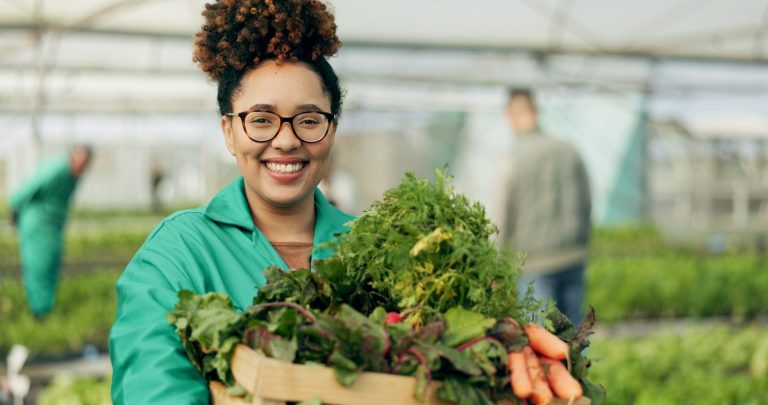High Educational Value
Nationally recognized educational quality at an affordable price.
*Source: O*Net/U.S. Bureau of Labor Statistics. Unity Environmental University cannot guarantee employment. Salary data represents averaged earnings for the occupations listed and includes workers at all levels of education and experience.

This course explores vital aspects of transitioning to sustainable food systems, covering production to consumption dynamics. You will delve into supply chains, distribution, and consumer behaviors, examining topics like food security, justice, waste, and policy influence. Through case studies, group projects, and digital technology integration, you’ll develop skills in systems thinking and problem-solving for sustainable food systems.

This course guides you through sustainable food production, moving beyond traditional methods to cover innovative approaches like vertical gardens and marine food production. Focused on enhancing food security and environmental conservation, you will critically analyze the interplay between production systems and resource management, considering biodiversity, climate resilience, and socio-economic factors.

This course delves into the influence of policy on sustainable food systems, exploring international, national, and local regulations. Covering financial, trade, land use, safety, and labeling aspects, you will learn to advocate for policy changes through case studies and analysis exercises, supporting the development of sustainable food systems.

Sustainable Food Systems involve eco-friendly practices like organic farming, mitigating environmental damage, and promoting social equity. The Unity program prepares graduates for leadership roles in sustainable agriculture, policy advocacy, and community resilience. It addresses global challenges, emphasizing equitable food access, policy influence, and community engagement to build just and resilient food systems. In essence, it’s a holistic approach to food production and distribution that prioritizes environmental sustainability, social justice, and long-term food security.
The MPS in Sustainable Food Systems immerses students in the complexities of sustainable food production, distribution, and consumption, emphasizing their impact on environmental sustainability and social equity. The program integrates interdisciplinary perspectives from environmental science, agriculture, economics, policy, and social sciences to provide a comprehensive understanding of sustainable food production, distribution, and consumption. Topics include organic farming, regenerative food production, and community-supported agriculture (CSA) programs. Students analyze the effects of climate change on crop yields and water availability, and evaluate food policies such as agricultural subsidies and food labeling standards. Through real-world projects and case studies, students develop skills in systems thinking, problem-solving, and advocacy. Graduates are equipped to address challenges in the food industry and drive initiatives towards more just, resilient, and environmentally-conscious food systems.
Your online education should be affordable and manageable. Thanks to our promise to keep tuition flat through 2030, you won’t be burdened with unexpected increases or fees.
Our team of distance education concierges will work with you through the admissions process to help you plan and pay for your degree. Learn more about the costs here.
The timeframe for completion is up to you! Enroll in 6 credits per term and complete the program within just one year. Alternatively, opt for part-time study by taking one course at a time. Whichever path you choose, we’re here to support your educational journey every step of the way. Contact your concierge or advisor to create your personalized plan.
Professional Masters Core: 15 credits
Major Program Core: 15 credits
For a better look into your program, view our full course catalog. Then apply online for free to get started.
The Master of Professional Science (MPS) is a graduate degree designed to combine scientific knowledge with practical skills relevant to the workforce. Unlike traditional science degrees, the MPS emphasizes hands-on experience and professional development, preparing students for careers that require both expertise in science and the ability to apply that knowledge in real-world contexts. MPS programs focus on a range of skills that are directly applicable to the workplace:
The MS degree is a traditional graduate program focused on deepening scientific understanding through research and academic study.
The sustainable food systems degree requires 30 credits with a minimum 3.0 GPA. View our full course catalog for a better look into your program. Then apply online for free to get started.
Nationally recognized educational quality at an affordable price.
Committed to sustainable practices to prepare for a future of environmental awareness.
Dedicated to turning career and academic aspirations into tangible achievements.
Fast-track your Master’s degree and finish your program in as little as one year.
Connect with experts who share your passion for working in the industry.
Ranked in the top 1% of universities nationwide by the Social Mobility Index.
With up to 5 terms a year, you can take a break without jeopardizing financial aid.
Balance life, work, and education by studying when and where you want.